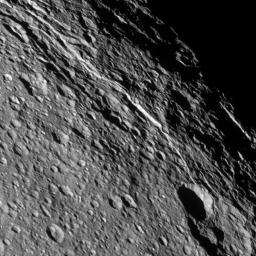
|
Rhea’s Record
- Click the image above for a larger view
- Full-Res JPEG (1016 x 1016) (189.3 kB)
- Full-Res TIFF (1016 x 1016) (1.0 MB)
Caption:
The surface of Saturn's moon Rhea bears witness to its violent history. Each crater seen here records an impact in the moon's past.
On some of Rhea's terrains, craters are so densely packed that they lie on top of each other, newer impacts often erasing the older craters. Rhea is 949 miles, or 1,528 kilometers across.
This view is centered on terrain at 38 degrees north latitude, 290 degrees west longitude. The image was taken in visible light with the Cassini spacecraft narrow-angle camera on Dec. 22, 2012.
The view was acquired at a distance of approximately 19,000 miles (31,000 kilometers) from Rhea and at a Sun-Rhea-spacecraft, or phase, angle of 30 degrees. Image scale is 600 feet (183 meters) per pixel.
Background Info:
The Cassini-Huygens mission is a cooperative project of NASA, the European Space Agency and the Italian Space Agency. The Jet Propulsion Laboratory, a division of the California Institute of Technology in Pasadena, manages the mission for NASA's Science Mission Directorate, Washington, D.C. The Cassini orbiter and its two onboard cameras were designed, developed and assembled at JPL. The imaging operations center is based at the Space Science Institute in Boulder, Colo.
For more information about the Cassini-Huygens mission visit http://saturn.jpl.nasa.gov . The Cassini imaging team homepage is at http://ciclops.org .
Cataloging Keywords:
| Name | Value | Additional Values |
|---|---|---|
| Target | Rhea | |
| System | Saturn | |
| Target Type | Satellite | |
| Mission | Cassini-Huygens | |
| Instrument Host | Cassini Orbiter | |
| Host Type | Orbiter | |
| Instrument | Imaging Science Subsystem (ISS) | |
| Detector | Narrow Angle Camera | |
| Extra Keywords | Crater, Grayscale, Impact, Visual | |
| Acquisition Date | ||
| Release Date | 2013-03-25 | |
| Date in Caption | 2012-12-22 | |
| Image Credit | NASA/JPL-Caltech/Space Science Institute | |
| Source | photojournal.jpl.nasa.gov/catalog/PIA14654 | |
| Identifier | PIA14654 | |
